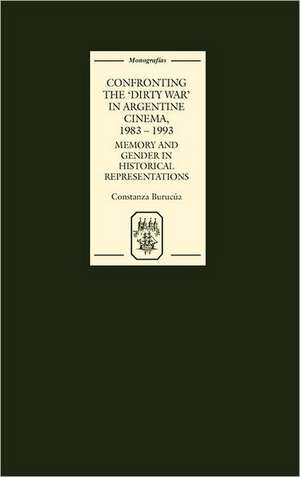Confronting the `Dirty War` in Argentine Cinema, – Memory and Gender in Historical Representations: Monografias A
Autor Constanza Burucúaen Limba Engleză Hardback – 18 mar 2009
Constanza Buruca, having completed her PhD at the University of Warwick, is an independent film producer in Caracas.
Din seria Monografias A
-
 Preț: 163.91 lei
Preț: 163.91 lei -
 Preț: 221.11 lei
Preț: 221.11 lei - 11%
 Preț: 579.68 lei
Preț: 579.68 lei - 23%
 Preț: 752.71 lei
Preț: 752.71 lei -
 Preț: 374.78 lei
Preț: 374.78 lei - 11%
 Preț: 579.34 lei
Preț: 579.34 lei -
 Preț: 220.63 lei
Preț: 220.63 lei - 19%
 Preț: 645.19 lei
Preț: 645.19 lei - 19%
 Preț: 645.98 lei
Preț: 645.98 lei -
 Preț: 291.31 lei
Preț: 291.31 lei - 19%
 Preț: 558.47 lei
Preț: 558.47 lei - 19%
 Preț: 558.47 lei
Preț: 558.47 lei - 19%
 Preț: 645.51 lei
Preț: 645.51 lei -
 Preț: 380.97 lei
Preț: 380.97 lei - 19%
 Preț: 674.51 lei
Preț: 674.51 lei - 19%
 Preț: 674.36 lei
Preț: 674.36 lei - 19%
 Preț: 609.79 lei
Preț: 609.79 lei - 19%
 Preț: 645.19 lei
Preț: 645.19 lei - 23%
 Preț: 901.44 lei
Preț: 901.44 lei - 19%
 Preț: 644.57 lei
Preț: 644.57 lei - 19%
 Preț: 675.29 lei
Preț: 675.29 lei - 19%
 Preț: 675.78 lei
Preț: 675.78 lei - 19%
 Preț: 558.31 lei
Preț: 558.31 lei - 23%
 Preț: 755.85 lei
Preț: 755.85 lei - 19%
 Preț: 557.69 lei
Preț: 557.69 lei - 19%
 Preț: 674.98 lei
Preț: 674.98 lei - 19%
 Preț: 676.70 lei
Preț: 676.70 lei - 19%
 Preț: 643.65 lei
Preț: 643.65 lei - 19%
 Preț: 557.55 lei
Preț: 557.55 lei - 23%
 Preț: 901.74 lei
Preț: 901.74 lei - 23%
 Preț: 725.59 lei
Preț: 725.59 lei - 19%
 Preț: 674.98 lei
Preț: 674.98 lei - 19%
 Preț: 651.28 lei
Preț: 651.28 lei - 19%
 Preț: 645.19 lei
Preț: 645.19 lei - 19%
 Preț: 677.49 lei
Preț: 677.49 lei - 23%
 Preț: 1043.33 lei
Preț: 1043.33 lei - 19%
 Preț: 645.19 lei
Preț: 645.19 lei - 23%
 Preț: 892.85 lei
Preț: 892.85 lei - 19%
 Preț: 558.47 lei
Preț: 558.47 lei - 19%
 Preț: 674.98 lei
Preț: 674.98 lei - 19%
 Preț: 645.51 lei
Preț: 645.51 lei - 19%
 Preț: 644.27 lei
Preț: 644.27 lei - 19%
 Preț: 670.79 lei
Preț: 670.79 lei - 19%
 Preț: 674.68 lei
Preț: 674.68 lei - 19%
 Preț: 679.04 lei
Preț: 679.04 lei - 19%
 Preț: 644.27 lei
Preț: 644.27 lei - 23%
 Preț: 725.31 lei
Preț: 725.31 lei - 23%
 Preț: 728.25 lei
Preț: 728.25 lei - 23%
 Preț: 725.00 lei
Preț: 725.00 lei - 19%
 Preț: 674.68 lei
Preț: 674.68 lei
Preț: 674.98 lei
Preț vechi: 833.31 lei
-19% Nou
Puncte Express: 1012
Preț estimativ în valută:
129.17€ • 133.26$ • 109.33£
129.17€ • 133.26$ • 109.33£
Carte tipărită la comandă
Livrare economică 05-19 martie
Preluare comenzi: 021 569.72.76
Specificații
ISBN-13: 9781855661806
ISBN-10: 1855661802
Pagini: 242
Dimensiuni: 164 x 241 x 21 mm
Greutate: 0.52 kg
Ediția:New.
Editura: Tamesis Books
Seria Monografias A
ISBN-10: 1855661802
Pagini: 242
Dimensiuni: 164 x 241 x 21 mm
Greutate: 0.52 kg
Ediția:New.
Editura: Tamesis Books
Seria Monografias A
Cuprins
Introduction
In Focus: On Film and History, National Cinema and Mourning Work
Revisiting Third Cinema: Its Legacy and Derivations in Argentine National Cinema
Remnants of the Dirty War: On the Policial, the Political Thriller and the Paramilitary Thriller
Gendering History: The Dirty War in Women's Cinema
Metaphoric Representations of the 1976-1983 Military Dictatorship
Conclusion
















